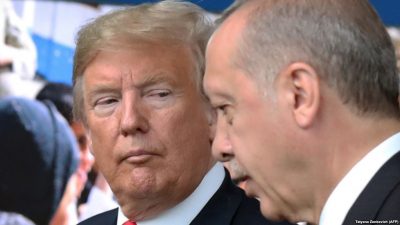Turkey’s “Mask Diplomacy” Mends Bad Relations with U.S.

A letter from Turkish President Recep Tayyip Erdoğan to U.S. President Donald Trump accompanied medical supplies sent to the U.S. from Turkey. There is little hiding that the U.S. is the most affected country from the coronavirus pandemic with over a million cases and about 60,000 deaths. Turkey too is also struggling with the coronavirus, with over 3,000 deaths and 117,000 cases, if official data is to be believed.
In the letter to Trump, Erdoğan said
“You can be sure, as a reliable and strong partner of the U.S., we will continue to demonstrate solidarity in every way possible.”
Turkey seems to be getting inspiration from China by engaging in “mask diplomacy” and is helping many coronavirus affected countries in a bid to try and create good will after it tarnished its reputation when it attempted to asymmetrically invade Greece with illegal immigrants in February and March. However, its mask diplomacy initiative with the U.S. is for a very different purpose than that with the EU, and this was revealed in a statement by Fahrettin Altun, Erdoğan’s Director of Communications.
“We stand in solidarity with the United States, our NATO ally, against COVID-19,” he said on Twitter.
U.S. Secretary of State, Mike Pompeo, then went to Twitter to thank Turkey for their donation of medical supplies and their “friendship, partnership and support” while emphasizing that “during times of crisis, NATO allies must stand together.”
Erdoğan’s relationship with the U.S. became openly confrontational as the Turkish president insisted on purchasing Russia’s powerful S-400 missile defense system that the U.S. argued is not compatible with NATO. Not only did Erdoğan resist NATO threats and purchased the missile defense system, but he opened Russo-Turkish relations to flourish to unprecedented levels.
Trump resisted calls from the U.S. Congress to impose sanctions on Turkey, and it has proven to be a masterstroke from the president’s perspective as he knew sooner or later Erdoğan would break from Russia. The Turkish president in recent months has become enraged at Moscow for not budging on its Syria and Libya policy. Erdoğan wanted Russia to convince the Syrian Army not to engage in a highly successful operation to liberate large swathes of Idlib, while also demanding Russia to force the Wagner volunteer group to withdraw its fighting force from operating in Libya.
As Erdoğan’s geopolitical goals in Syria and Libya failed and he wants to put the blame on Russia, coupled with the coronavirus putting a heavy strain on the volatile Turkish economy, he has no choice but to reopen relations with Washington to have some respite from the ever-increasing problems he is dealing with.
Yesterday, the Turkish lira plummeted to 6.98 for $1USD, forcing the central bank to burn other foreign exchange reserves. The Turkish Statistical Institute found that confidence in the Turkish economy is at its lowest possible level after confidence fell from 91.8% to 51.03% in the past month. Turkish officials said in April that Ankara was in talks with Washington to secure a swap line from the U.S. Federal Reserve. However, the Fed has not included Turkey in its program of opening up the credit line of accepting foreign currencies in exchange for dollars. As the Fed is yet to do this, is Erdoğan’s gift to the U.S. to convince Trump to allow the bank to open up a line of credit?
According to an Ipsos poll, 59% of Turks consider the coronavirus pandemic to be their biggest worry. This means the economy is taking a backseat for now, giving Erdoğan some respite from public scrutiny. But coronavirus will not be a pandemic forever and the economy will have to come to the forefront of public attention once again. It is for this reason that Turkey is pre-emptively attempting to recover relations with the U.S. and emphasizing that they are NATO allies. This is in the hope that sanctions against Turkey can be averted and some economic assistance can be provided to help recover the dire situation.
Although some thought Turkey was finally entering the multipolar world order and escaping the grasps of U.S. hegemony, it now appears that Ankara was only using Russia as a leverage against Trump who was not supporting Erdoğan’s ambitions in Syria. The Turkish president thought that perhaps Russian President Vladimir Putin would endorse and support Turkey’s Syria policy, but this too came to a dead end, thus forcing Erdoğan back towards NATO. Whether Trump will speak to the Fed to open up a line of credit to Turkey remains to be seen, but what is undoubtful is that Erdoğan has certainly increased his chance of this occurring as he desperately seeks a way to avoid economic catastrophe and find other methods of economic assistance outside of the International Monetary Fund.
*
Note to readers: please click the share buttons above or below. Forward this article to your email lists. Crosspost on your blog site, internet forums. etc.
This article was originally published on InfoBrics.
Paul Antonopoulos is an independent geopolitical analyst.

